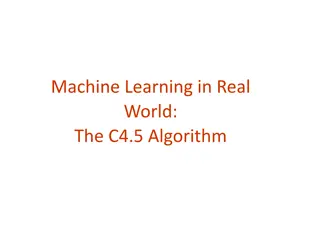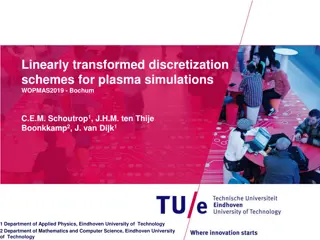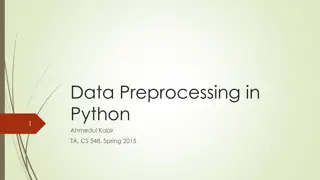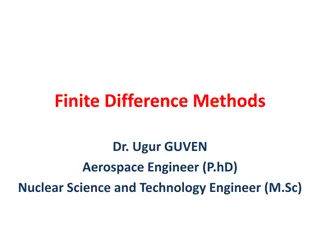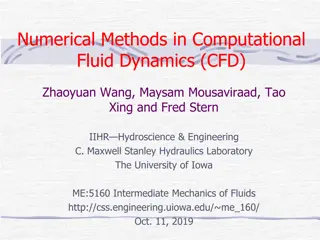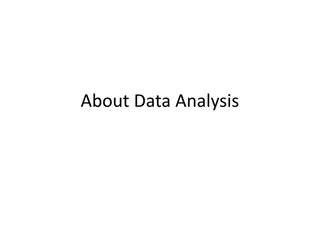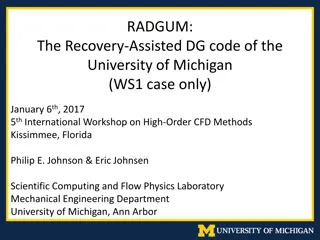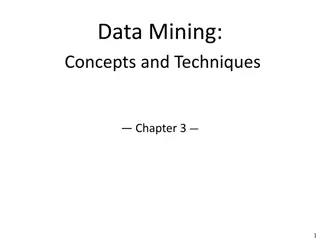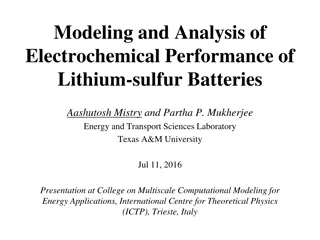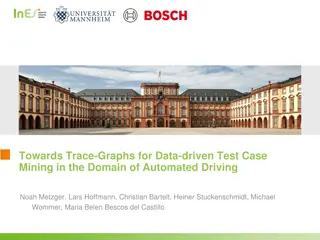The C4.5 Algorithm in Machine Learning
Explore the C4.5 algorithm, a powerful tool in the realm of machine learning. Delve into topics such as numeric attributes, information gain, entropy calculations, and handling missing values. Learn about the importance of attribute selection, class-dependent discretization, and making optimal split
8 views • 17 slides
Linearly Transformed Discretization Schemes for Plasma Simulations
Addressing the computational challenge of CO2 decomposition with plasmas, this study focuses on developing advanced discretization schemes and modern iterative linear solvers to ensure physical invariants are respected. The research explores the use of chemical invariants to simplify complex systems
3 views • 22 slides
Renormalization Group Analysis of Magnetic Catalysis in Quantum Field Theories
Explore the phenomenon of magnetic catalysis in strong magnetic fields through a renormalization group analysis, drawing parallels to superconductivity and dimensional reduction. Discuss the impact of IR dynamics on nonperturbative physics like superconductivity. Delve into Landau-level quantization
1 views • 21 slides
Data Preprocessing Techniques in Python
This article covers various data preprocessing techniques in Python, including standardization, normalization, missing value replacement, resampling, discretization, feature selection, and dimensionality reduction using PCA. It also explores Python packages and tools for data mining, such as Scikit-
5 views • 14 slides
Overview of Finite Difference Methods in Computational Fluid Dynamics
Discretization of equations is crucial in CFD, and Finite Difference Methods play a key role. Utilizing Taylor series, forward differences, rearward differences, and central differences, these methods transform partial differential equations into solvable algebraic forms. Understanding these techniq
5 views • 32 slides
Overview of Numerical Methods in Computational Fluid Dynamics
This material delves into the properties, discretization methods, application in PDEs, grid considerations, linear equations solution, and more involved in Numerical Methods in Computational Fluid Dynamics. It covers approaches to fluid dynamical problems, components of numerical methods, and their
4 views • 40 slides
Exploring Watersheds and Runoff with Physical and Computational Models
Engage in hands-on activities using physical models like a big tarp to simulate rainfall on landscapes and explore the movement of water. Dive into discussions about the pros and cons of using physical models for studying water flow. Discover the introduction to computational models and discretizati
0 views • 38 slides
About Data Analysis
Delve into the world of data analysis with insights on data processing pipelines, elementary feature engineering, variable transformation, discretization, missing data imputation, categorical encoding, outlier removal, and date/time engineering. Explore various methods to enhance data quality and op
19 views • 18 slides
GFDL Finite Volume Cubed-sphere Dynamical Core (FV3)
Finite-volume approach resulting in the GFDL Finite Volume Cubed-sphere Dynamical Core (FV3) with features like grid stretching, horizontal discretization, and Lagrangian vertical coordinate for hydrostatic atmosphere equations on a sphere.
3 views • 10 slides
Data Management and Analysis in Ocean Acoustic Recordings
Measurements of sound in the ocean pose challenges due to high frequencies and large data sets. Establishing a standard data model and aggregation service for acoustic recordings can streamline analysis processes. Discussing file discretization, aggregation, best practices, and potential solutions f
5 views • 6 slides
Recovery-Assisted DG Code Overview at University of Michigan
Recovery-Assisted DG code of the University of Michigan presented at the 5th International Workshop on High-Order CFD Methods. The code features spatial discretization using Discontinuous Galerkin, nodal basis, explicit Runge-Kutta time integration, and other non-standard features such as ICB recons
0 views • 31 slides
Data Mining Concepts and Techniques Chapter 3: Data Preprocessing Overview
Data preprocessing plays a crucial role in ensuring data quality for effective data mining. This involves tasks such as cleaning, integration, reduction, transformation, and discretization to address issues like missing values, noisy data, outliers, and inconsistencies. The chapter delves into the i
1 views • 61 slides
Modeling and Analysis of Electrochemical Performance in Lithium-Sulfur Batteries
Explore the mathematical models, finite volume discretization, and charge conservation in the electrochemical discharge of lithium-sulfur batteries. This study delves into the concentration balance, volume balance for solids, and more to enhance battery performance and efficiency.
2 views • 25 slides
Data-driven Test Case Mining in Automated Driving Domain
Explore how trace graphs are utilized for data-driven test case mining in the automated driving domain. The study addresses challenges with traditional testing approaches, proposing a new method for quantifying real-world scenarios through parameter discretization models. Evaluation and discussion h
3 views • 14 slides
Computational Methods in Engineering: Introduction to Partial Differential Equations
Explore the basics of Parabolic Partial Differential Equations (PDE) and their semi-discretization techniques in computational engineering. Learn about common Finite Difference methods for solving various types of PDEs. Dive into the world of PDEs with a focus on diffusion, advection-diffusion, Lapl
3 views • 21 slides
Finite Element Discretization for Structural Domain Equations
Explore figures depicting numerical solutions, exact solutions, and finite element discretizations for structural domain equations. Understand concepts such as approximate solutions, interpolated solutions, and gradients, with comparisons between exact and approximate values.
0 views • 10 slides
Numerical Methods in Computational Fluid Dynamics and Discretization Techniques
Explore the essential concepts of numerical methods in computational fluid dynamics, including discretization methods, finite difference, finite volume, and finite elements. Learn how to transform differential equations into algebraic form and choose the right approach for accurate solutions in flui
2 views • 22 slides
Numerical Simulation of Flow Past a Square Cylinder - Characteristics and Results
Explore a study conducted on flow past a square cylinder by Harsharaj B. Parmar in December 2019. The study covers the Finite Difference algorithm, second-order spatial discretization, time integration schemes, velocity-pressure coupling methods, and immersed boundary techniques. Results include ana
0 views • 14 slides
Geodesics on Tensor Product Surfaces: Modeling and Calculation
Explore the concept of geodesics on tensor product surfaces, including the calculation methods and applications. Learn about the challenges involved in determining geodesics and the strategies to approximate them efficiently. This article discusses techniques such as path discretization, optimizatio
2 views • 7 slides
Solving Heat Equation with Interfaces Research
Explore the innovative research on solving the heat equation with interfaces. Discover applications in metallurgy, steel continuous casting, mathematical biology, cancer treatment, and ecological modeling. Dive into numerical treatments, temporal discretization, spatial discretization techniques, an
0 views • 16 slides
